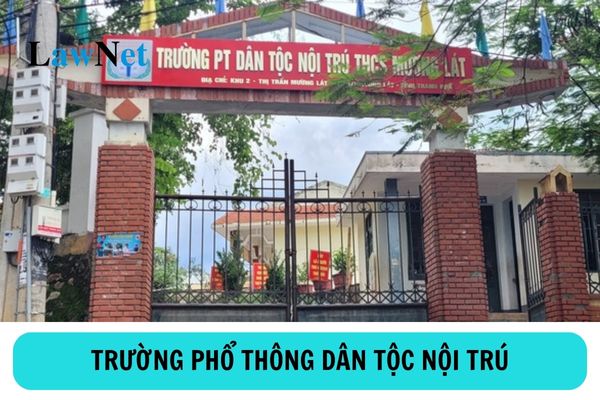Vietnam: What are the duties of boarding ethnic secondary schools?
What are the duties of boarding ethnic secondary schools in Vietnam?
According to the provisions of Article 3 of the regulation on organization and operation of boarding ethnic secondary schools, issued together with Circular 04/2023/TT-BGDDT, the boarding ethnic school shall perform the tasks specified in the Charter of secondary schools and the following tasks:
- Care for, nurture and administer boarding ethnic students; make sure that boarding ethnic students could study, eat, stay and live safely at the school.
- Organize special educational activities suitable for boarding ethnic students.
- Educate students on the guidelines and policies of the Party and State on ethnic minorities; cultural identity and fine traditions of the ethnic groups of Vietnam; on consciousness of participating in socio-economic development in ethnic minority and mountainous areas, and extremely disadvantaged areas.
- Provide vocational education and traditional vocational training suitable to the capacity and quality of students, and local socio-economic development conditions and requirements.
- Monitor and make statistics on the number of students, evaluate the educational effectiveness annually and in each period to develop appropriate solutions to improve the educational quality of the boarding ethnic schools.

What are the duties of boarding ethnic secondary schools in Vietnam? (Image from the Internet)
What is the organizational structure of boarding ethnic secondary schools in Vietnam?
Under Article 7 of the Regulations on the Organization and Operation of boarding ethnic secondary schools issued together with Circular 04/2023/TT-BGDDT, boarding ethnic secondary schools in Vietnam have the following organizational structure:
- The organizational structure of the boarding ethnic school shall comply with the provisions of the Charter of the secondary school.
In addition, the boarding ethnic school is allowed to set up no more than 03 groups to assist the principal in carrying out the tasks of special education, care, nurturing and management of boarding ethnic students.
The establishment of these groups is decided by the school principal on the basis of consensus of the governing body. Each group has a team leader, if there are 07 members or more, there is a deputy leader.
The team leaders and deputy leaders of these groups are appointed by the principal, under the management and direction of the principal.
- The groups in charge of special education, caring for, nurturing and managing boarding ethnic students have the following tasks:
+ Actively develop plans for special education, caring for, nurturing and managing boarding ethnic students by week, month, semester and school year; coordinate with other specialized groups in formulating and implementing education plans of the school;
+ Performing tasks as planned;
+ Participate in professional training as prescribed;
+ Perform other tasks assigned by the principal;
+ Organize activities at least once in 2 weeks and may hold unscheduled meetings according to work requirements or at the request of the principal. These groups operate on the principle of democracy, the members help each other to perform well the task of educating, caring for, nurturing and managing boarding ethnic students.
- Each class of the boarding ethnic school has no more than 35 students.
What are the eligible candidates for enrollment for boarding ethnic secondary schools in Vietnam?
According to the provisions of Article 9 of the regulation on organization and operation of boarding ethnic secondary schools, issued together with Circular 04/2023/TT-BGDDT, the eligible candidates for enrollment for boarding ethnic secondary schools in Vietnam include:
(1) Students being ethnic minorities who themselves and their parents or guardians permanently reside for 36 consecutive months or more, up to the date of submission of enrollment documents, in:
- Communes, wards, townships of Region III and extremely disadvantaged villages in ethnic minority areas and mountainous areas, extremely disadvantaged communes in coastal areas and islands according to regulations of competent authorities (hereinafter referred to as extremely disadvantaged communes and villages);
- Communes, wards and townships of regions II and I in ethnic minority and mountainous areas according to regulations of competent authorities.
(2) Students from ethnic minorities with very small population as defined in Decree 57/2017/ND-CP.
(3) Students being Kinh people who themselves and their parents or guardians have permanently resided for 36 consecutive months or more, up to the date of submission of enrollment documents, in extremely disadvantaged communes and villages. The boarding ethnic school is allowed to enroll no more than 10% of Kinh students in the total number of new enrollments each year.
(4) In case the number of eligible candidates specified in (1), (2), and (3) is smaller than the size of the boarding ethnic school in the province, the People's Committee of the province may specify more regions to create human resources for ethnic minorities in order to enroll more ethnic minority people from poor or near-poor households that they and their parents or guardians have resided since for 36 consecutive months or more in this area, up to the date of application submission.

